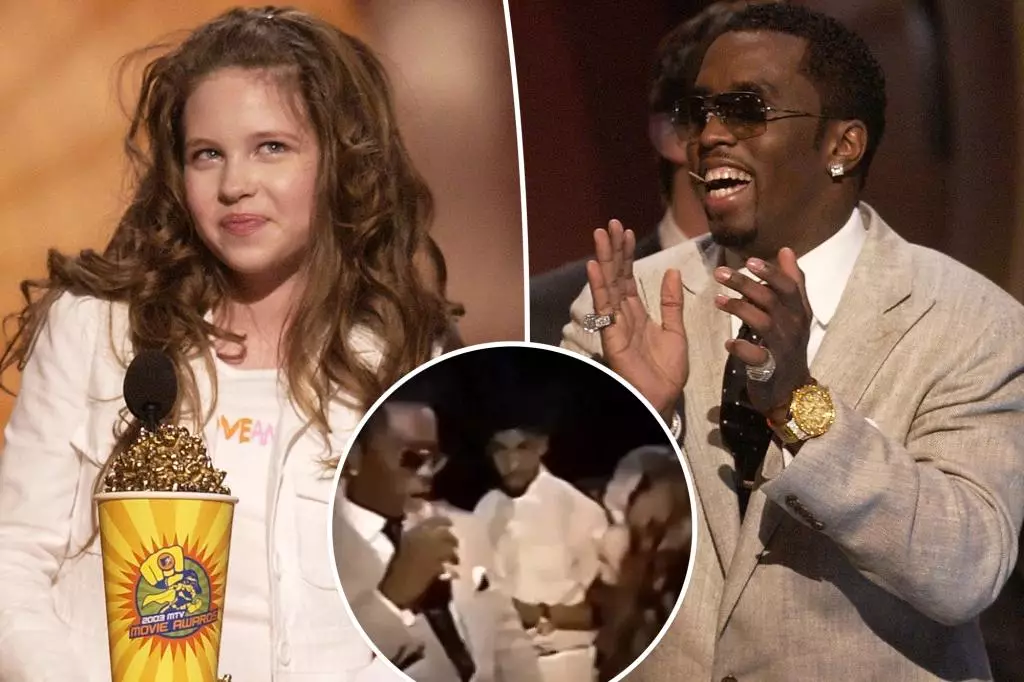The resurfacing of a video featuring Sean “Diddy” Combs has reignited intense scrutiny over the music mogul’s past, especially in the context of serious allegations concerning his interactions with minors. The clip, which captures a seemingly innocuous moment from the 2003 MTV Movie Awards, raises uncomfortable questions about the implications of such interactions, particularly at a time when Combs is facing multiple allegations of sexual misconduct.
In the video that has since gone viral, Combs, who was 33 at the time, approaches then-12-year-old actress Daveigh Chase backstage and invites her to an afterparty. This moment seems playful on the surface; however, the implications are far darker when viewed in the light of recent scandals. At the time, Combs was a prominent figure in the entertainment industry, known for throwing extravagant parties. Chase had just been presented with an award for her role in “The Ring,” a horror film that catapulted her to fame. The carefree atmosphere captured in the video starkly contrasts with the serious nature of the allegations brought against Combs, suggesting a troubling disconnect between celebrity culture’s glamor and the potential predation that often lurks beneath.
Social media reactions to the resurfacing of the video underscore the disquiet surrounding Combs’ past behavior. Users expressed outrage, suggesting a sense of foreboding during that era of unchecked celebrity privilege, where young actors like Chase may have felt tremendous pressure and vulnerability. This incident serves as a microcosm of a much larger issue within Hollywood—a culture that has historically prioritized the protection of powerful figures over vulnerable individuals, particularly minors.
The situation brings forth the troubling dynamics of power within the entertainment industry, particularly regarding the treatment of young talents. The seemingly light-hearted interaction, where a well-known adult extends an invitation to a child, becomes complex when viewed through a lens of potential grooming and exploitation. Chase, already in the public eye, was still a child and—as many commentators noted—she was likely unaware of the multifaceted risks involved in such interactions.
Additionally, the presence of Ashton Kutcher during this moment adds another layer to the narrative. Kutcher’s known affiliations with the entertainment industry and past comments about his awareness of Combs’ lifestyle elicit further questions. Why was such behavior permitted, and what were the cultural mechanisms that allowed these dynamics to persist unchallenged? Kutcher’s benign participation in the video sheds light on how normalization plays a crucial role in perpetuating troubling behavior.
Currently, Combs is grappling with a myriad of legal challenges, ranging from allegations of sex trafficking to civil lawsuits involving numerous victims, many of whom are minors. These serious accusations present a stark contrast to the playful image of the music mogul portrayed in the resurfaced video. The gravity of the situation cannot be overstated; allegations involve minors and situations that transpired over two decades ago, complicating matters and eliciting both disbelief and outrage from the public.
Critics of Combs have noted the stark discrepancy between his public persona of joviality and the sinister allegations emerging against him. The current climate surrounding sexual misconduct allegations has emboldened voices that were once silenced, leading to a reevaluation of past interactions that, at first glance, may seem harmless. As investigations unfold, more tales of similar interactions may come to light, prompting a broader reckoning within the industry.
The resurfaced video of Diddy with Chase invites us to engage in deeper reflection regarding celebrity culture, accountability, and the often problematic entertainment industry dynamics. As public awareness grows surrounding issues of exploitation and consent, we are left wondering about the long-term ramifications for those involved—both the alleged perpetrators and the children caught in their orbit.
As the legal proceedings against Combs progress, society will continue to wrestle with the implications of power, privilege, and the duty of care owed to the most vulnerable. It remains unclear what the future holds for Combs, but one thing stands certain: his legacy will be indelibly marked by these allegations, demanding a critical examination not only of his actions but the structures that allow such behavior to persist unchecked. The ongoing conversation about consent, power, and youth’s protection in the world of entertainment is more essential now than ever.

Leave a Reply